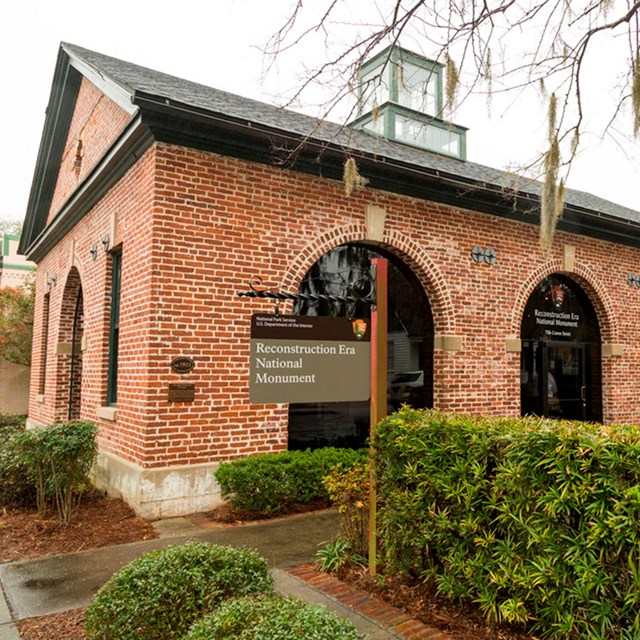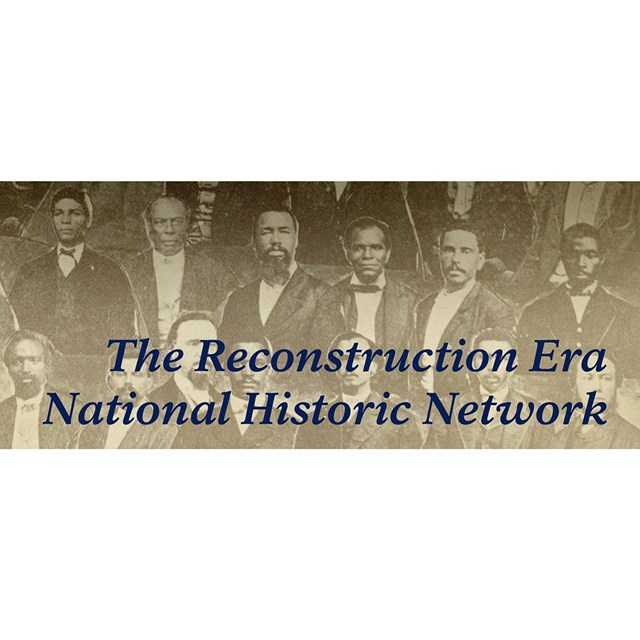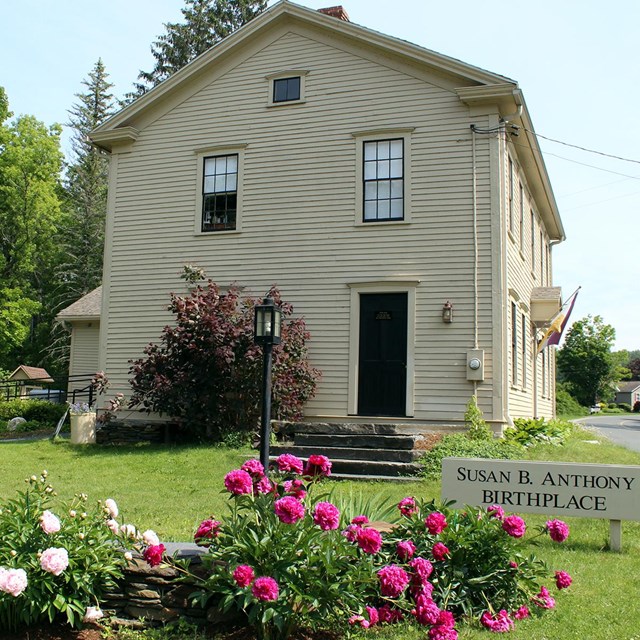Contact Us
Reconstruction: 1867 and 1869
In the years after the Civil War, Frederick and Susan fight to make the United States a country for all – where everyone can vote. What gets in the way of this dream? Will their friendship survive betrayal?
Host: Ashley C. Ford
-
The Agitators Episode 3: Reconstruction: 1867 and 1869
In the years after the Civil War, Frederick and Susan fight to make the United States a country for all – where everyone can vote. What gets in the way of this dream? Will their friendship survive betrayal?
- Credit / Author:
- WSCC, PRX, NPS
- Date created:
- 11/25/2020
ASHLEY C. FORD The Women’s Suffrage Centennial Commission, the National Park Service, and PRX present The Agitators, a play by Mat Smart.[Audio logo]
We begin today’s episode in 1867. After the Civil War, during Reconstruction, some Americans believed a radical restructuring of the country could take place. Frederick Douglass and Susan B. Anthony were critical to the founding of the American Equal Rights Association – the A. E. R. A. – which had the goal of securing universal suffrage. Voting rights for all Americans.
But as the campaign went on, the wealthy white men who funded it grew to believe that only Black men getting the right to vote – but not women – was politically viable. Also, as Susan mentions in Episode One, women’s rights were so curtailed in society – women couldn’t even eat at a restaurant alone – there was still the notion that – why did women need to vote? Their husbands could vote. Their husbands could represent them. On top of that -- many women at the time were anti-suffragists themselves. Oof, exhausting, isn’t it?
As we’re about to hear, the lack of support from within the A. E. R. A. led Susan B. Anthony and Elizabeth Cady Stanton to find outside funding from a questionable source. The growing tension within the A. E. R. A. finally exploded in 1869 when Susan and Frederick had a messy, bitter, and very public debate. We actually have the transcript from that fight – and it was brutal. Essentially, Susan and Frederick each said: if we both can’t have the vote, then I should get it first.
Ashley C. Ford here. This is The Agitators.
Episode Three: Reconstruction. 1867 and 1869.
Boston & Maine Railroad Station Haymarket Square Boston, Massachusetts December 10, 1867
[It is six-and-a-half years later. There are numerous platforms and railroad tracks crisscrossing every which way. It is a bustling train station. The sounds of trains and steam fill the air. FREDERICK, now 49, rushes across a platform. SUSAN, now 47, walks the other direction on a parallel platform. Out of the corner of her eye, she sees FREDERICK]
SUSAN Frederick! Frederick Douglass! Frederick Augustus Washington Bailey! Fred!
FREDERICK Hallo there, Friend Susan!
SUSAN Where are you off to?
FREDERICK Westborough. And you?
SUSAN Hartford. Oh, excuse me. How long have you been in Boston?
FREDERICK What?
SUSAN What are you doing in Boston?
FREDERICK What?
SUSAN I will come over. Excuse me.
FREDERICK It is not safe to cross the tracks!
SUSAN I am not afraid of trains. [The rumbling of a train approaching. SUSAN retreats back to her platform. The sound is deafening. They wait for it to pass]
I will use the stairs.
FREDERICK Are you with George Francis Train?
SUSAN Yes, and Elizabeth. They are minutes behind me. We lectured here last night. Hartford is tonight. Where does your train terminate?
FREDERICK Albany.
SUSAN I will change my ticket and go with you to Westborough, then transfer to the New Haven line in Springfield.
FREDERICK It is about to depart – Pardon me – SUSAN But we have much to discuss.
FREDERICK I know – and I apologize I have not yet answered your letters – but this lecture tour has been grueling.
SUSAN We needed you in Kansas. We needed you and you knew we did.
FREDERICK This is not a conversation for a train station.
SUSAN If we had had the full backing of the A. E. R. A. in Kansas – if you had not let Wendell Phillips cut off our funding –
FREDERICK I have no say in funding.
SUSAN If you had come with us, your voice would have made the difference.
FREDERICK My voice was needed here, too. I cannot be two places at once.
SUSAN Stop! – you owe me thirty seconds! This country is being reconstructed – as we speak. People are ready for change. All blacks – all women – together. Equal Rights for All. We could have passed both referendums in Kansas if –
FREDERICK Both were soundly defeated –
SUSAN Because the Republicans betrayed us! We had no support – no money –
FREDERICK Is that why you turned to a racist for funding? George Francis Train is a racist and a bigot. “Women first and the Negro last” – that is his slogan. Why are you and Elizabeth lecturing with him?
SUSAN He supports woman suffrage. He does not speak of anything else with us.
FREDERICK Susan –
SUSAN He offered the money when no one else would.
FREDERICK He is an insult to everything we are trying to achieve.
SUSAN “I would unite with anybody to do right and with nobody to do wrong.”
FREDERICK Do not quote me to me.
SUSAN You are funded by sexists. You are funded by misogynists.
FREDERICK I must go.
SUSAN Elizabeth and I were crossing Kansas in wagons, fording streams, giving speeches in saw mills. Our lives were threatened. We were terrified at night. The chance of bandits robbing or raping or killing us was real. Never was I so driven by desperation. [A train whistles] Let me change my ticket and ride with you to Westborough.
FREDERICK There is not time.
[The whistle blasts. FREDERICK rushes down the platform and boards his train just as it departs. Its engines rev. SUSAN, alone on the platform, watches FREDERICK’s train leave the station. They look at one another – as the distance grows between them]
A Boarding House New York City May 12, 1869
[It is a year-and-a-half later. The foyer of a boarding house. In the middle of the floor, there is a large, wooden trunk. SUSAN kneels on the floor, in the middle of the mess of boxes, programs, pamphlets, and papers. She sorts through the materials and puts what she needs into the trunk. After some time, FREDERICK enters, unseen]
FREDERICK How have you been?
SUSAN [startled] Oh, I – Busy. And you?
FREDERICK The same. I arrived at Steinway Hall early for the evening session, but I could not find you. I thought I would check here.
SUSAN I sent the materials here to the boarding house in advance. I did not leave enough time to sort through them, put today’s materials in the trunk, and bring it to the Hall. I should already be there. Elizabeth is probably throwing a fit.
FREDERICK How can I help?
SUSAN Any papers or pamphlets you see marked for today, put in the trunk.
FREDERICK Certainly.
SUSAN Thank you. It is good to see you, my friend.
FREDERICK And you. How long have we known each other now?
SUSAN Twenty years.
FREDERICK Hard to believe we have put up with each other for twenty years.
SUSAN Indeed. FREDERICK Feels like at least thirty. Tonight, I am going to introduce a resolution that calls for the American Equal Rights Association to give its unequivocal support to the Fifteenth Amendment.
SUSAN I. . . I do not understand. This is the American Equal Rights Association. Our sole purpose is to secure universal suffrage. It is not the Black Men’s Rights Association. Nor is it the Women’s Rights Association. It is the American Equal Rights Association.
FREDERICK Yes, but –
SUSAN The Fifteenth is a constitutional amendment that disenfranchises half of this country. It is the opposite of our mission. I do not even know what to say to such a despicable suggestion – what shall you have me say?
FREDERICK That you will stand with me. Will you stand with me?
SUSAN You cannot be serious.
FREDERICK This in-fighting of the A. E. R. A. has hurt the chances of the Fifteenth being ratified. It has already been two months and we only have thirteen states. We barely won New York and we still need fifteen more? If Susan B. Anthony had a change of heart and supported it – that could sway the country.
SUSAN You overstate my influence.
FREDERICK You are on the front page of the newspaper once a week. What you say matters.
SUSAN What I say is reported on, but what does it matter without the vote?
FREDERICK We need fifteen more states to get the Fifteenth ratified – to make the Constitution a little less fraudulent than it is now. We need you.
SUSAN I will support it with the addition of one word. “The right of citizens of the United States to vote shall not be denied or abridged on account of race, color, previous condition of servitude” or sex – That one word will make this country whole.
FREDERICK We tried for it, but –
SUSAN I tried. You did not.
FREDERICK We all tried and we all failed – the States are already voting on it. It is too late to change a single word. And if we continue this feud, the A. E. R. A. will be ripped apart and the ratification of the Fifteenth will be thrown into further jeopardy.
SUSAN Surely, you know what strings to pull in congress to make it happen – and with your crony Ulysses in the White House intimidating legislators like he’s still on the battlefield –
FREDERICK He is not my crony.
SUSAN Oh, that is right, how could he be? He failed to come through with a cabinet appointment for you. Take him off the list!
FREDERICK After 250 years of bondage, the vote is within reach of the black man – we must take it.
SUSAN We women stood beside you throughout the Civil War. We put aside our needs because the need to end slavery was greater.
FREDERICK And we are beyond grateful.
SUSAN You could not have done it without us! And now you want to leave us behind? The wording of the amendment is vague and flawed. It states that the right to vote “shall not be denied or abridged.” Why does it not protect the right? You have been in politics longer than I. You know when someone says, “it shall not be denied or abridged,” the first order of business will be denying and abridging.
FREDERICK It is the language we could get.
SUSAN The Southern States are already plotting ways they could use the amendment to deny and abridge the black man’s vote.
FREDERICK It is what we could get. It is a step in the right direction. Please – will you join me? An oak tree that grew on the bank of a river was uprooted by a storm.
SUSAN I am not in the mood for fables.
FREDERICK The oak tree was thrown through the air and fell among some reeds growing by the water. It said to the reeds, “How is it that you, who are so frail and slender, have managed to weather the storm, whereas I, with all my strength, have been torn up by the roots and hurled into the river?” “You were stubborn” said the reeds. “You fought against the storm, which proved stronger than you. But we reeds bow and yield to every breeze, and thus the gale passed harmlessly over our heads.” Will you be the reeds today?
SUSAN No. [SUSAN throws the rest of her papers into the trunk and slams it shut] Porter! I must get to Steinway Hall. I am already late.
FREDERICK Your support would mean success.
SUSAN The only thing it would mean is that I, like you, have sacrificed my ideals. Porter! No matter. I will carry the trunk myself.
FREDERICK Let me help you.
SUSAN I do not need your help! Oh!
FREDERICK Allow me. Dammit, my wrist. You have overloaded the trunk. Let us take some out. We can make two trips.
SUSAN No.
FREDERICK Sometimes you cannot put everything in at once. Sometimes you have to take it piece by piece.
SUSAN If I must take it piece by piece, I would first give it to women. . . . What happened? Up until Kansas, it felt as though we were all in lockstep together. You and me – Elizabeth and Lucretia – Lucy and Martha and Gerrit – it felt like we all believed we could remake this country together. When did you stop believing we could pass universal suffrage?
FREDERICK I still believe.
SUSAN You would not do this if you did.
FREDERICK Susan, the men of this country – the men who vote and the men in congress – are not ready for woman suffrage.
SUSAN Was the country ready to abolish slavery? Or for a civil war? How can you know if it is ready for the black man to vote but not women?
FREDERICK What if we try for both and get neither?
SUSAN So be it. Porter, please! Porter! Move along, Mr. Douglass. The only thing to see here is the carcass of the equal rights movement.
FREDERICK Come, now.
SUSAN Do you see me as lesser?
FREDERICK No.
SUSAN Do you see women as lesser than men?
FREDERICK No.
SUSAN Then do not betray us.
FREDERICK Betray? You have no more loyal friend than I.
SUSAN You are a coward.
FREDERICK They are killing us! This is not a question of rights. This is life or death for the black man.
SUSAN For women as well.
FREDERICK When women, because they are women, are hunted down through the streets when their children are torn from their arms, and their brains dashed out upon the pavement when they are in danger of having their homes burnt down over their heads when you are dragged from your house and hung upon a lamp-post then you will have the urgency to obtain the ballot equal to my own.
SUSAN Is that not all true about black women?
FREDERICK Yes – it is true of the black woman – not because she is a woman, but because she is black.
SUSAN How many women do I know – black and white – who have been beaten and raped without recourse? Open your eyes! We cannot protect ourselves without the vote. Our bodies are objects, constantly under attack. If we say anything, we are ostracized. We are blamed. It is life and death for women as well.
FREDERICK As the child of a rape I know of the violence women face.
SUSAN And yet you would still do this?
FREDERICK . . . Yes. SUSAN This morning, I found myself thinking of the eulogy you gave at my father’s funeral. It was beautiful. He loved you. FREDERICK And I loved him.
SUSAN And I cannot help but think – if he was alive to hear what you have said and what you are about to do – it would have broken his heart.
FREDERICK Your father is gone. You cannot speak for him.
SUSAN You have broken mine.
[SUSAN looks FREDERICK directly in the eyes. He looks away, unable to meet her stare. After a few moments, FREDERICK goes to the trunk and tries to pick it up. He fails. He closes his eyes, crouches, and tries again. With a strength that comes from a place he has not had to summon in many years, FREDERICK lifts the trunk onto his shoulder. Slowly, but steadily, he stands, bearing the immense weight on his own. Eventually, he looks SUSAN in the eyes]
ASHLEY C. FORD End of Episode Three. . . . I can’t help but wonder: what if the A. E. R. A. had insisted on universal suffrage? Is there. . . an alternative United States history where, in 1870, all Americans got the right to vote? Or what if the A. E. R. A. had tried for that ideal and failed? What if, in 1870, voting rights weren’t expanded for anyone? What then?
. . . If you want to hear more on this, check out And Nothing Less, our sister podcast from the Women’s Suffrage Centennial Commission. Hosts Rosario Dawson and Retta take listeners on a historical journey through the untold history of the entire women’s suffrage movement; and episode Three, Truth is Of No Color, focuses on how the movement was just as much a civil rights story as a gender battle. Subscribe today.
I’m Ashley C. Ford.
This was The Agitators by Mat Smart, from the Women’s Suffrage Centennial Commission, the National Park Service, and PRX Productions.
The podcast adaptation was envisioned by Commission Executive Director Anna Laymon, with support from Kelsey Millay. Performances by Madeleine Lambert as Susan B. Anthony and Cedric Mays as Frederick Douglass. Directed by Logan Vaughn. Original music and score by Juliette Jones and Rootstock Republic. The production team includes Executive Producer Jocelyn Gonzales and Managing Producer Genevieve Sponsler. Post-production sound and mixing by Sandra Lopez-Monsalve and Ian Coss. Original music and score recorded, mixed, and mastered by Joshua Valleau. Vocals and Theme song production by Hunter LaMar. Additional production by Brett ‘Whitenoise’ White. Train station sound design by David Kelepha Samba.
Additional music by Epidemic Sound. Special thanks to David Herman of Good Studio, Dan Dietrich of Wall-to-Wall Recording, and Erin Sparks and Jacob Mann at Edge Media Studios.
To learn more about the history of the suffrage and abolition movements, visit the show’s website at GO DOT N-P-S DOT GOV SLASH suffrage podcast.
Listener Companion from the National Park Service
Find out more about the people, places, and stories from Episode Three.-
 South CarolinaReconstruction Era NHP
South CarolinaReconstruction Era NHPThe Reconstruction Era was a time of tumult as the US as a whole grappled with a new reality after the end of the institution of slavery.
-
 Reconstruction Era National Network
Reconstruction Era National NetworkExplore places associated with the history of Reconstruction through this NPS program.
-
 Places of Susan B. Anthony
Places of Susan B. AnthonyVisit several places associated with Susan B. Anthony, including her home in Rochester, New York and Steinway Hall in New York City.
Credits
The Agitators by Mat Smart, brought to you by the Women’s Suffrage Centennial Commission, the National Park Service, and PRX Productions.The podcast adaptation was envisioned by Commission Executive Director Anna Laymon, with support from Kelsey Millay.Performances by Madeleine Lambert as Susan B. Anthony and Cedric Mays as Frederick Douglass. Directed by Logan Vaughn. Original music and score by Juliette Jones and Rootstock Republic. The production team includes Executive Producer Jocelyn Gonzales and Managing Producer Genevieve Sponsler. Post-production sound and mixing by Sandra Lopez-Monsalve and Ian Coss.
Original music and score recorded, mixed, and mastered by Joshua Valleau. Theme song production by Hunter LaMar. Original music and score recorded, mixed, and mastered by Joshua Valleau. Vocals and Theme song production by Hunter LaMar. Additional production by Brett ‘Whitenoise’ White. Train station sound design by David Kelepha Samba. Additional music by Epidemic Sound. Special thanks to David Herman of Good Studio, Dan Dietrich of Wall-to-Wall Recording, and Erin Sparks and Jacob Mann at Edge Media Studios.
Last updated: November 25, 2020

